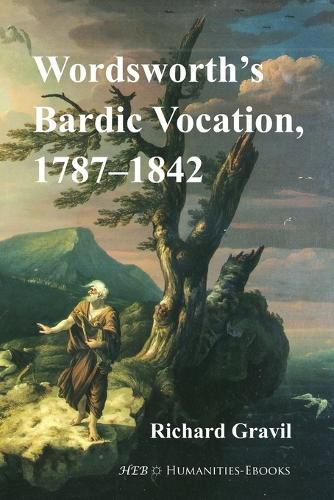Readings Newsletter
Become a Readings Member to make your shopping experience even easier.
Sign in or sign up for free!
You’re not far away from qualifying for FREE standard shipping within Australia
You’ve qualified for FREE standard shipping within Australia
The cart is loading…






This title is printed to order. This book may have been self-published. If so, we cannot guarantee the quality of the content. In the main most books will have gone through the editing process however some may not. We therefore suggest that you be aware of this before ordering this book. If in doubt check either the author or publisher’s details as we are unable to accept any returns unless they are faulty. Please contact us if you have any questions.
This book presents the poet as balladist, sonneteer, minstrel, elegist, prophet of nature, and national bard. The book argues that Wordsworth’s uniquely various oeuvre is unified by his sense of bardic vocation. Like Walt Whitman or the bards of Cumbria, Wordsworth sees himself as ‘the people’s remembrancer’. Like them, he sings of nature and endurance, laments the fallen, and fosters national independence and liberty. His task is to reconcile in one society ‘the living and the dead’ and to nurture both ‘the people’ and ‘the kind’. Part 1 offers a comprehensive account of Wordsworth’s early interest and his later researches into antiquarian matters and the contemporary significance of such interest. It includes readings of The Vale of Esthwaite, An Evening Walk, Yew-Trees and the pagan sonnets that introduce Ecclesiastical Sketches. Part Two considers the Salisbury Plain poems, The Ruined Cottage, Lyrical Ballads and the enlightenment ideas about nature underlying The Poem upon the Wye. Part Three explores elegiac Wordsworth in the ‘Lucy’ poems, his creation of archetypal heroes (Michael, the Discharged Soldier, the Leech-Gatherer) to people the Cumbrian landscape, and how Wordsworth reconfigured ‘manliness’ in such poems as Brougham Castle, Hart-Leap Well and The White Doe of Rylstone. Part 4 examines The Excursion, the political sonnets, The Convention of Cintra, the Waterloo poems, the 1842 publication of The Borderers and Guilt and Sorrow in the era of Chartism, and (new to this edition) the Intimations Ode.
$9.00 standard shipping within Australia
FREE standard shipping within Australia for orders over $100.00
Express & International shipping calculated at checkout
This title is printed to order. This book may have been self-published. If so, we cannot guarantee the quality of the content. In the main most books will have gone through the editing process however some may not. We therefore suggest that you be aware of this before ordering this book. If in doubt check either the author or publisher’s details as we are unable to accept any returns unless they are faulty. Please contact us if you have any questions.
This book presents the poet as balladist, sonneteer, minstrel, elegist, prophet of nature, and national bard. The book argues that Wordsworth’s uniquely various oeuvre is unified by his sense of bardic vocation. Like Walt Whitman or the bards of Cumbria, Wordsworth sees himself as ‘the people’s remembrancer’. Like them, he sings of nature and endurance, laments the fallen, and fosters national independence and liberty. His task is to reconcile in one society ‘the living and the dead’ and to nurture both ‘the people’ and ‘the kind’. Part 1 offers a comprehensive account of Wordsworth’s early interest and his later researches into antiquarian matters and the contemporary significance of such interest. It includes readings of The Vale of Esthwaite, An Evening Walk, Yew-Trees and the pagan sonnets that introduce Ecclesiastical Sketches. Part Two considers the Salisbury Plain poems, The Ruined Cottage, Lyrical Ballads and the enlightenment ideas about nature underlying The Poem upon the Wye. Part Three explores elegiac Wordsworth in the ‘Lucy’ poems, his creation of archetypal heroes (Michael, the Discharged Soldier, the Leech-Gatherer) to people the Cumbrian landscape, and how Wordsworth reconfigured ‘manliness’ in such poems as Brougham Castle, Hart-Leap Well and The White Doe of Rylstone. Part 4 examines The Excursion, the political sonnets, The Convention of Cintra, the Waterloo poems, the 1842 publication of The Borderers and Guilt and Sorrow in the era of Chartism, and (new to this edition) the Intimations Ode.